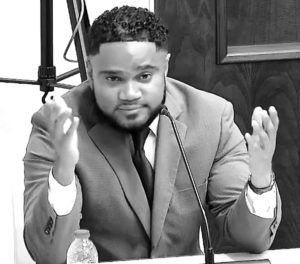
During its meeting on Friday, July 21st, the Committee on Gun Crime & Violence had as its guest, well-known local lawyer, Mr. Devin Hodge. Mr. Hodge shared some very relevant pieces of advice with the committee members, and by extension with the general public. One of his prime concepts was armed neutrality, advocating that more persons should have the right to bear weapons for their protection.
To support this gun-crime mitigation concept, Mr. Hodge explained the arms environment in the jurisdiction of Switzerland where the number of licensed gun users is high, but where gun-related violence is very low.
“One of the fundamental mechanisms that is used in Switzerland to achieve such a low rate of violence with the use of firearms,” he said, “is the inculcation of young people, from a tender age, where boys and girls acquire education and training in respect to the use and ownership of firearms.”
“For a society like ours,” Mr. Hodge went on, “this would be an odd concept to even fathom. However, when one is assessing the likely causes for such a high rate of firearm crimes in our country, I believe that education can go a long way, as it does in Switzerland. Here, you expose persons from a young age to realities of the use, ownership and the legal implications of guns. I believe that education can help to ameliorate the violence that we see in our society.”
He promoted arms neutrality as a key principle of the Swiss society. He felt that our local legislation should be altered to some degree to provide more consideration to qualified persons who apply for firearms licenses.
“Armed neutrality in Switzerland,” he said, “essentially takes into consideration the fact that when a large number of persons in a society are equipped with equal or proportionate force, in comparison to that of would-be offenders, then such an offender would second guess or think twice before imposing any sinister force with his weapon because he would realize that he could be met with the same force from a licensed firearm holder.”
However, Mr. Hodge said that he realized what this would mean in the Anguilla context with regard to its Firearms Act.
“With regard to our Firearms Act, at present,” he noted, “the Commissioner of Police is the licensing authority. I want to make the point that I think there should be some refinement to the legislation with respect to the criteria that is applied for the granting of firearms licenses.”
“Currently, the Act requires that the Commissioner finds there to be good reason,” he said. “But I think the concept of ‘good reason’ is far too subjective. I think there needs to be more objective criteria because the different positions of incoming Commissioners of Police will impact upon whether or not licenses are granted.”
“This is problematic,” he said. “Historically, there has not been enough consistency in the granting of firearms licenses. And this is something that we must consider if we are to aspire toward armed neutrality.”
In advocating the concept, Mr. Hodge said that persons must be trusted to take care of their own protection because due to the geographic location of Anguilla, government would never be able to keep the island’s borders safe over the long term and guns will definitely continue to penetrate over the long term.
“What this means then,” he said, “is that the people who live here needs to have a better sensitization to the negative effects of firearm use and possession, and people will need to be entrusted, through training and education, in order to responsibly possess firearms. And that is how you will achieve armed neutrality.”
Mr. Hodge said among other measures that should be taken to deter the proliferation of gun crime and the entry of guns would be to install more lighting at all the ports.
He suggested solar lights should be installed, as well as a system of CTV cameras at vulnerable bays where boat operators would be prone to smuggle in weapons. “Like in the Forest – Let’s light up the Forest at night time,” he declared.







